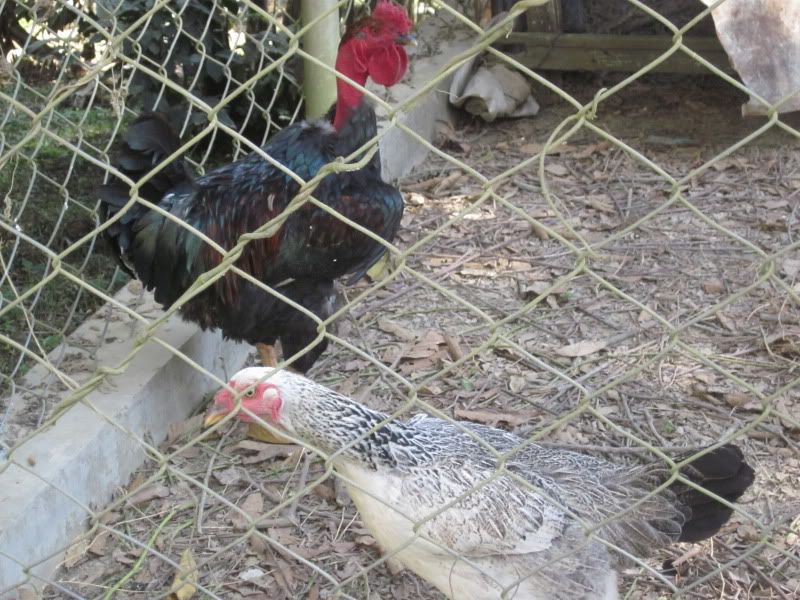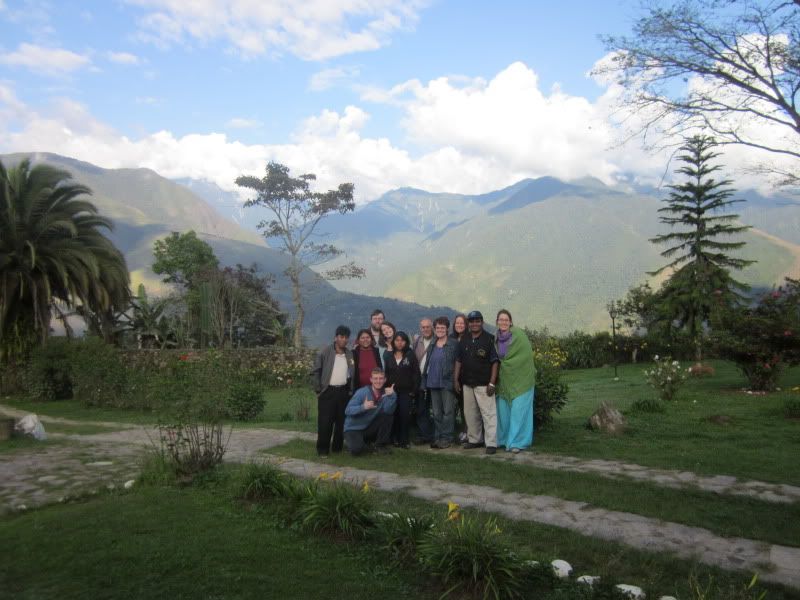As I briefly mentioned, I had a migraine during our first day in Yungas. A BAD migraine. And I left my meds in the hotel. I ended up laying on the floor with my eyes closed while everyone else roasted coffee. Pretty soon, I had to ask for help. Friends helped me leave the coffee demonstration and go find something to eat and drink to see if that would bring a bit of relief.
At this point, an Aymara woman came up to us. When Tanya, our tour guide, explained about my headache, the woman became very concerned. Her name, it turns out, is Bertha, and she is a very close friend of Tanya's from when Tanya lived in Yungas. I sat down with her, kind of wanting to be left alone, but soon became engaged in conversation with her. Bertha was wonderful.
We talked about our mutual love of chickens. She had some criollo chickens that matured at the usual rate (six months), and a few Cornish cross industrial broiler chickens that matured in a mere 40 days. (Imagine a child growing to adult size by age four... sick!) The industrial broilers are from the school's vet program, which is a lot less organic than the agriculture program. When I showed up that day, Bertha had a chicken in one hand and a knife in the other. The chicken was now nowhere to be seen, but I had caught a glimpse of it lying limp on the ground before it was plucked as we had returned from harvesting coffee.

Most of Bertha's chickens are free range, but these two are locked up together because they are a mating pair.
I asked Bertha if the chickens were for meat or eggs. She looked at me with the same confused look EVERY Bolivian gave me when I asked that question. Both! (Unsaid here: why would you have chickens and use them for only one or the other?) We giggled over different ways to kill chickens, and I told her about a friend who calls herself "a good rooster murderer." And we talked about our families a bit too.
I had all but forgotten about my migraine by the time the rest of the group was ready to leave. I gave Bertha a big hug and hoped I'd get to see her again during our time in Yungas.
Flash forward to the next day. We didn't see Bertha at all until dinner time. As it turned out, today was Bertha's brother Javier's birthday. Tanya had invited him out for a celebratory dinner, and another gringa who lives in Yungas, Sarah, invited his sister and her family (Bertha, her husband, and her daughter).
Javier, strangely, picked us up in his van and drove us into town, dropping us at the restaurant but not joining us. I don't know why. Apparently, he's a bit weird. But Bertha and her family did join us. It was a nice restaurant that wouldn't be super-fancy in the U.S., but it was certainly on the high end in Coroico. The restaurant was run by a French woman and offered a mix of French and Bolivian fare.
As I sat down near our Bolivian friends, I noticed nothing out of the ordinary initially. I enthusiastically ordered llama with a white wine sauce and ginger that was served with mashed sweet potatoes and another delicious Andean vegetable that I now forget. Bertha and her family didn't even open their menus. Tanya ordered for all of them.
What I was entirely ignorant of was that this was their FIRST TIME IN A RESTAURANT. Ever. They initially told Tanya they would get nothing (we were treating) and she coaxed the two girls into ordering trout and Bertha's husband into ordering llama. He had never eaten llama before, even though he is from Bolivia, where it is commonly eaten. Llamas are raised and eaten at higher altitudes, but around here one would have to purchase llama meat if they wanted any.
I commented on my meal, recalling the first time encountered the Spanish word for ginger, jenjibre. I couldn't even imagine what on earth "jengibre" meant! Bertha replied that she STILL doesn't know what jengibre is. That is, she's never heard of or eaten ginger before. It made me feel very lucky that I've been fortunate enough to encounter and try foods from all over the world, and usually I can eat whatever I want, whenever I want.
Once the food came, the mood lightened up, and we began joking. There might have been wine involved (I can't remember). We passed tastes of our food around, and I let Bertha try some ginger from my meal. We talked some more about my chickens, and the Bolivians seemed to love hearing about them. They asked if I ate them and I pretended to be horrified and said "No! They are my princesses!" The Bolivians giggled. Here, where chickens are dinner, it seemed very silly to consider a chicken a precious pet.
After we finished, we gringos ordered a few desserts: tiramisu and a chocolate banana crepe. Then we passed them around the table for everyone to share, insisting that our Bolivian friends help themselves to generous portions. By this time we were all having a great time and we started joking about the fact that we were celebrating Javier's birthday without him. "Happy Birthday, Javier!" I said. The Bolivians laughed. I told them I hoped he had another birthday tomorrow, because this was fun! They laughed again.
They dropped us off at our hotel, where we all gave one another lots of hugs and exchanged email addresses (Bertha is learning how to email with Sarah's help). The next morning, they walked to our hotel very early in the morning for another round of hugs and to see us off. Here's a picture of our group, with the gorgeous Yungas landscape in the background:

(Looking at this picture at the end of the trip, we decided that it was almost too perfect to be on earth, but the miserable little chuspi bugs that bite you up make it quite unlike heaven.)
As we talked after our dinner, a few things came out. This was our Bolivian friends first time ever dining at a restaurant like this. Bertha's husband told Tanya that he would remember his life all his life. And yet, this meal, while delicious, was routine for the Americans in our group. But now I would remember it too, feeling somewhat guilty and sheepish that I can afford delicious meals at restaurants whenever I like and for so many people on earth, such meals are once in a lifetime experiences, if that.
I'm not sure if I am accurately conveying the experience and my feelings with mere words here, because it feels so much more powerful than something that can be described in words. I think our Bolivian friends might feel a little guilty or beholden to us for treating them to such an - in their worlds' - lavish, expensive meal. And do they also feel the inequality, that we can dine like this every night if we wish, and they cannot enjoy such meals at all, ever, unless we treat them?
But most of all, the experience was just sheer joy at meeting and enjoying a meal with such lovely, wonderful people. Even with linguistic and cultural barriers in the way, Bertha's kindness comes across loud and clear. I hope that I will be able to see her again in the future, and I also hope that I can do something about the inequality in our world that allows me to treat my chickens like princesses while hers must be dinner, and that allows me to dine in any restaurant I like, even one half a world away in Bolivia, but denies Bertha the same opportunity.
No comments:
Post a Comment